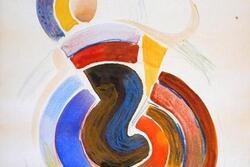Six Months After Colleyville: The Power of Journalism and (Less So) Running
My feet hit the ground in an uneven, desperate sprint towards some unknown finish line. My heart pounds to the beat of Meghan Trainor’s hit song “NO!” as she belts the repetitive chorus through my airpods. What am I doing here? I’m not a runner. I wouldn’t even go so far as to call myself an exercise enthusiast; in fact, I avoid cardio at all costs. I don’t like Meghan Trainor. But here I am, at 7:00 a.m. on a Saturday morning, racing down my street, determined to enter “Runner’s Bliss” (that might not be what it’s called—I truly have no knowledge of the running world), and drown out an inner dialogue that has been playing in my mind for the past week.
The week, six months ago tomorrow, began unlike any other, with my family and I glued to the TV, anxiously switching back and forth between every news source on cable. That Saturday morning, a gunman walked into a small synagogue in Colleyville, Texas and held four Jewish individuals hostage. Throughout the day, I struggled to find updates on the situation, refreshing my news app every few minutes. That night, I sent a carefully worded but clearly distraught email to the head of my high school and our dean of diversity, equity, inclusion and social justice, asking that an administrator send out an email to the school to inform the student body on the act of terrorism.
On Monday, I found myself seated across a table from two administrators at my school. I wasn't in trouble, they told me, but the large, echoey room and the adults’ accusatory stares told another story. By the end of our discussion, the verdict was disturbingly clear: there would be no email sent out. If I wanted my classmates to know, I would have to tell them.
Discouraged and still reeling from the events of the past weekend, I took the story of Colleyville and the continued hatred against Jewish individuals in this country to our school newspaper, where I’m a writer and editor-in-chief.
I chose to write about what makes antisemitism unique among other forms of discrimination. I wanted to learn how this hatred has persisted for so many years and explore the ways it has manifested throughout history.
I threw myself into this article. Ancient antisemitic conspiracies consumed my thoughts; my hour-long interview with a UC Berkeley professor on the history of antisemitism played on repeat in my head and I woke up countless times in the middle of the night to scribble down an idea that I needed to add to the piece. Submerging myself in this work was both cathartic and exhausting.
On the one hand, it was empowering to combine the most important aspect of my identity, Judaism, with my greatest passion, writing. I felt energized by my article and found myself working on it during lunch breaks, time I normally allotted for homework, and the moments before dinner while my mom interrogated me about my day.
However, it was also draining and deeply saddening. Though I felt an immense privilege to be able to tell the story of antisemitism (or at least a small part of it), I also felt the gravity of this responsibility weighing down on me. There was so much to say, so many perspectives to include, and all of the possible directions I could take the piece paralyzed me. This story was so important to me, and part of my fixation on making it perfect lay within my fear of messing it all up.
Nothing about this experience made sense to me. Why was I responsible for leading a crash course on antisemitism to my school’s student body? Was it even worth writing this article that I was sure wouldn’t be read by a single student at my school? I decided if the answer to these questions existed, it would probably reveal itself in “Runner’s Bliss,” the aforementioned state of calm, introspection, and all-knowingness (well, that might be a stretch) achieved on the third or fourth mile of an intense run.
Unsurprisingly, I didn’t get to a third or fourth mile on my run. After half a mile, I stood on the side of the road, buckled over in pain and exhaustion. As I trudged home in shame, however, I entered what I’ve decided to call “Walker’s Bliss” (working title). I realized that I don’t need to know the answers to any of these questions, I just have to keep doing what brings me purpose and comfort: writing. My article arrived at no clear conclusion as to why antisemitism exists or why it persists today, as I hoped it would. But that doesn’t make the experience any less valuable.
Thinking back to my frustration at the lack of media coverage when the hostage situation first occurred, I realized how important my piece really was. Not because it was going to reach millions of readers or have a profound impact on the way my classmates understand antisemitism, but because through writing, I was able to share a story that mattered to me–one that wasn’t being told elsewhere. Journalism has the power to give a voice to the voiceless, and that is reason enough to keep doing it, even when we get a little lost in the details.
This piece was written as part of JWA’s Rising Voices Fellowship.






